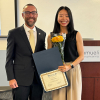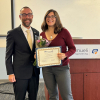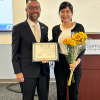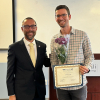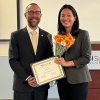Faculty Lauded for Teaching, Research, Innovation and Service Excellence
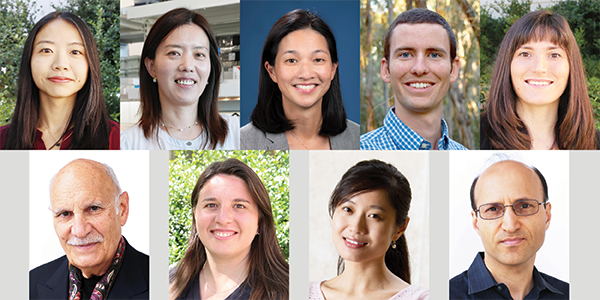
The 2024 faculty award winners are, top row from left, Yanning Shen, Han Li, Wendy Liu, David Copp and Christine King; bottom row from left, Diran Apelian, Iryna Zenyuk, Mo Li and Hamid Jafarkhani.
June 17, 2024 - Samueli School Dean Magnus Egerstedt recognized nine faculty members for their outstanding service and contributions at an end-of-the-year celebration on June 11 at the Donald Bren Hall and Patio.
The annual faculty awards acknowledge and honor the valued contributions of professors in four categories -- teaching, research, innovation and service. Nominations must meet specific criteria and are submitted through department chairs. Awardees are selected by a voting committee that consists of the dean and associate deans.
Egerstedt told the faculty and staff attending that the annual awards are one of his favorite events. “I believe the key to success is to hire great people, give them the tools and resources they need and then get out of the way,” he said. “Then, every now and then, stop to celebrate; that’s what we are doing today.”
Before announcing this year’s awardees, he acknowledged and thanked Zoran Nenadic, for his five years of service as chair of the Department of Biomedical Engineering, and Efi Foufoula-Georgiou for her seven years of service as the inaugural associate dean of research and innovation. He also noted the many individuals who received prestigious accolades this past year: 10 early career faculty recognitions; nine faculty achievement awards and 10 new fellows announced.
Here are the 2024 faculty award winners.
Excellence in Research
Early Career: Yanning Shen, assistant professor, EECS
Shen has made exceptional contributions to the analysis and application of machine learning, optimization and statistical signal processing tools to data and network science. Her research combines creativity, rigor and practical relevance and is aimed at applications of data and graph-driven machine learning for social, health, internet and financial networks. She has successfully collaborated internationally with researchers from Italy, France, Denmark, Singapore and China, demonstrating exceptionally high international visibility at this stage of her career. Recent awards include the 2021 Microsoft Security AI Research Award, 2022 Google Research Scholar Award, a 2022-2023 Hellman Fellowship and a 2023 Newkirk Faculty Fellowship.
Mid-Career: Han Li, associate professor, CBE
Li has an extremely productive and innovative research program. Her research addresses the conversion of renewable resources to medicines, fuels and commodities using engineered microbes – one of the most promising paths toward a sustainable future. Her work contributes to making the chemical reactions in biological cells more easily understandable, predictable and amenable to engineering. Ultimately, her technologies offer the means to reduce the carbon footprint in the manufacture of fuels and commodity chemicals, and make natural product-derived medicines more widely available to society. She has received numerous awards including the NSF Career Award, NIH Director’s New Innovator Award and Alfred P. Sloan Research Fellowship. She has filed patent applications and received significant industrial interest from both start-up and established companies.
Senior: Wendy Liu, professor, BME
Liu commands a well-funded, first-rate and internationally known research laboratory in immunoengineering and immunobiology. Her group employs engineering tools and modalities to improve tissue engineering and regeneration efforts by understanding how cues from the microenvironment of cells can control or regulate their immune responses. She has made great strides in engineering systems to control cell microenvironments and understand immune functions. Her work has been cited over 4,400 times in the last five years, underscoring the impact of her contributions to understanding and manipulating immune cell behavior in health and disease. Importantly, she achieves this success while being an excellent mentor to her trainees –at least one trainee from her laboratory was an author on recent high impact articles.
Innovation in Teaching
Early Career: David Copp, assistant professor of teaching, MAE
Copp is a superb teacher, innovator and mentor who has made a huge impact on our students and curriculum. He teaches, large-enrollment lecture, lab and project-based undergraduate courses, and is also an adviser for undergraduate design projects that serve around 400 students each year, including students from MAE, EECS, MSE and ICS. Copp co-developed the new Capstone Design course to pilot open-ended, real-world projects with smaller, focused teams that meet weekly with a project sponsor. This alternative to large-team projects emphasizes individual student contributions and provides a more equitable environment for all students to participate. He also fully redesigned several courses using specification grading, an equitable method that emphasizes students’ demonstration of learning as either sufficient for passing or not, rather than accumulating points to earn a desired grade. This type of grading has been shown to positively impact first generation and low-income students by improving their learning strategies, persistence in STEM majors and self-efficacy.
Mid-Career: Christine King, associate professor of teaching, BME
As an instructor and mentor, King has developed innovative approaches in research, teaching and service that have consistently engaged our undergraduates. She is committed to providing an active and immersive learning environment in the classroom; teaching students skills that will make them competitive for industry positions; and individualized and small-group mentorship. King has garnered considerable extramural and intramural funding, including a competitive five-year NIH R25 award to create a virtual reality platform for identifying unmet clinical needs, which allows students to experience clinical immersion virtually. This is a truly innovative and exciting way to bring the clinical experience into a classroom setting. She has also worked with several colleagues in the BME department and clinicians at CHOC Children’s to launch and assess multiple initiatives, ranging from a high-school COSMOS program to hack-a-thon events to address unmet clinical needs. She also directs BioENGINE, the undergraduate senior capstone program in which students learn about the practical applications of BME in entrepreneurship and industry.
Senior: Diran Apelian, Distinguished Professor, MSE
Apelian is an internationally recognized leader in engineering education. His contributions span a broad spectrum, from an edited volume on engineering education for the 21st century (Shaping our World, Wiley 2012), to establishing international programs for students to develop engineering solutions for societies with economic challenges. His work has been recognized with the ASM Easton White Distinguished Teacher Award in 2021 and the National Academy of Engineering’s Bernard M. Gordon Prize for Innovation in Engineering and Technology Education in 2016. At UCI, he has been a mentor and adviser to a large number of graduate students and developed new offerings related to sustainable materials engineering. Most recently, he created the Essential Skills in Engineering course in order to enhance critical skills that our graduates need but are often ignored in favor of more discipline-focused courses.
Innovators of the Year: Iryna Zenyuk, associate professor, CBE; and Mo Li, professor, CEE
Zenyuk and Li have conducted exceptional work in developing electrified, low-temperature processes to produce low-carbon cement. Each is a highly respected researcher and innovator in their respective fields and this collaborative effort, rooted in cutting-edge technologies in electrochemistry, cement chemistry and materials science, is achieved through the partnership of both laboratories. Their work is highly impactful as concrete is the world's most heavily used man-made material, and its manufacturing method remains unchanged over the past 140 years. Their patented novel electrolyzer technology would eliminate CO2 emissions from fossil fuel combustion; efficiently capture and reuse CO2 emitted during the conversion; and minimize both direct and indirect emissions while achieving substantial energy savings. To broaden their impact, they co-founded the Telluride Innovation Workshop on Cement Decarbonization, which brings together leaders from academia, industry and national laboratories to explore innovative approaches, and to identify high-risk/high-reward technologies for reducing carbon intensity and improving energy efficiency in cement manufacturing and CO2 storage.
Faculty Service: Hamid Jafarkhani, Chancellor’s Professor, EECS
Jafarkhani has left an indelible mark on the UCI campus with his service accomplishments at all levels - department, school and university. He has an exemplary record not only in terms of the number and breadth of positions he has held, but also in terms of the significant impact he has had while serving in these positions. Jafarkhani has distinguished himself on campus and in the IEEE as someone willing to devote countless hours to improving the communities in which he works. He has had a particularly profound impact on UCI graduate affairs, establishing rigorous practices within the EECS department that are still in operation, spearheading efforts to return nonresident graduate tuition and fees back to the departments to support their budgets, and directing an interdisciplinary graduate program and a large campus research center.
– Lori Brandt

